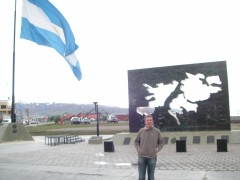The day I met my first South African
Posted in Africa, South Africa on June 14th, 2010 by Andy Jarosz – 4 CommentsThis story might sound strange to anyone under 30, while older folk may recognise some of the sentiments I experienced in this incident. I met my first South African in 1987. I remember it well. I was 18, halfway through another Inter-rail summer, and I was in the station in Salzburg ready to catch some sleep before a 4am train to Vienna. I got talking to a young backpacker girl, slightly older than me with long blonde hair. I thought her accent might be Dutch but she soon introduced herself as a South African.
Now at that time my exposure to South Africa was 100% negative. I was born at a time when sanctions were already in place. There was no cultural or political exchange with the country. As a sports fan I knew of South Africa as the place where our greedy and immoral sportsmen, past their prime and without shame, would go and earn a fortune on black-listed tours and sell their reputations for a few pieces of dirty silver.
I had heard of Nelson Mandela, thanks largely to a song that had done well in the charts. I didn’t know much about him, except that he was in prison and that he was a focus for the anti-apartheid movement in the UK. I knew the South African police were brutal in enforcing the rules of apartheid. I knew black people weren’t allowed to get on the same bus as white folk, share the same beach or live in the same streets.
I had never seen a South African movie or heard a South African song by a white artist. I knew of de Klerk and Botha thanks to the BBC, and heard about their ruthless grip on power. As a student I was not allowed to bank with Barclays, the only bank who liked to say Yes to the apartheid regime there. I had heard of Sun City, as a place where the wicked white folk would spend the money they had made from exploitation on gambling, golf and watching international singers who would sell their souls for a fat purse.
And then there was the song. In 1986 Spitting Image, one of the most popular UK programmes of the 80s and its in prime, released this as a B side to a song that reached no. 1 in the British charts.
So there you have it. That was the view of a South African as held by a fairly average teenager growing up in eighties Britain. There was no mention in the media of white people in South Africa who opposed apartheid or who did much good work in difficult circumstances in trying to improve the situation for all South Africans. We had a homogenous view of an entire group of people (did someone mention racism?).
So there I was, talking with this young girl. We must have chatted for a couple of hours before her train was called and we went our separate ways. I learned that her father was a farmer of oranges. But more than that, I learned that she was studying hard to go to university, that she wanted to see the world and that she had some great tips on the places I was about to visit in Austria and Yugoslavia. Pretty ordinary stuff. Oh, and she was a supporter of the anti-apartheid movement.
If I ever had to give a simple answer to the question I posed a couple of weeks ago in a post about travel being a waste of time, I should probably tell this story. The international media clearly served a role in applying the constant pressure that eventually signalled the end of the apartheid regime. But they also demonised an entire race in the eyes of millions, painting them as a one-dimensional group of racist thugs and bullies. It is only through this and subsequent interactions with ordinary South Africans that I was able to see beyond that stereotype.












